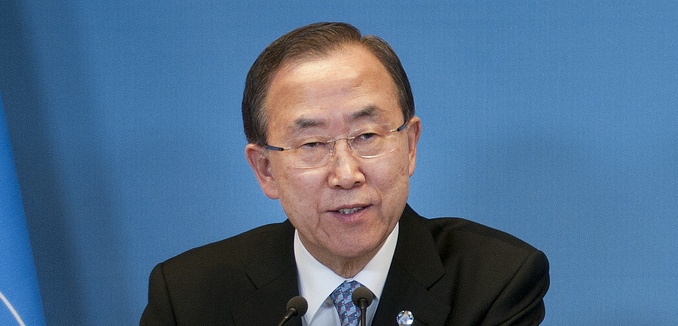United Nations Secretary-General Ban Ki-moon said last week that Palestinian terror was “human nature,” a natural reaction to Israeli occupation. This led to a series of condemnations from Israeli officials. Israeli Prime Minister Benjamin Netanyahu said the remarks gave a “tailwind to terror,” while former Israeli Ambassador to the United States Michael Oren, now a member of the Knesset, said that the statement was “legitimizing murder.” In an op-ed published Monday in The New York Times, Ban fired back at the Israeli government.
Rather than acknowledging that his remarks were in any way inappropriate, Ban chose to chastise Israel in the op-ed. He simply deflected the criticism by writing that some Israelis had been “twisting my words into a misguided justification for violence.” But describing violence as “human nature” does just that.
In the op-ed, the Secretary-General pointed to what he believes to be necessary for peace to occur, but provided absolutely no guidance how to get there.
We continue to work with Israel and the Palestinian Authority to rebuild Gaza and prevent another devastating conflict, and to press Palestinians for genuine national reconciliation. Of course, a lasting agreement between Israel and Palestine will require difficult compromises by leaders and peoples on both sides. Israeli authorities need to unequivocally support the Palestinian Authority and Palestinian institutions. This requires significant shifts in policies toward the West Bank and Gaza, while safeguarding Israel’s legitimate security concerns.
Genuine national reconciliation would include not just reconciliation between Fatah and Hamas, but also the official rejection by Hamas of its core aim, the destruction of Israel. The roadmap laid out by the Quartet, of which the UN is one of the parties, calls on the Palestinian leadership to issue an “unequivocal statement reiterating Israel’s right to exist in peace and security and calling for an immediate and unconditional ceasefire to end armed activity and all acts of violence against Israelis anywhere.” Even Fatah, the more “moderate” of the two, encourages violence against Israelis by inciting terror and by honoring terrorists who kill and attempt to kill Israelis.
The 2014 unity government announced by Fatah and Hamas failed to address this problem, as Hamas is still dedicated to Israel’s destruction. President Barack Obama called the joint government “unhelpful” to his efforts to achieve peace, and the agreement is often cited as an example of Palestinian actions that have derailed peace talks.
Aside from the failure of Hamas to accept Israel’s right to exist, its control of the Gaza Strip undermines any claim the Palestinian Authority has to control over its own territory, a key component of sovereignty and a necessary condition for statehood. Even the PA’s control over the West Bank may be tenuous, as Israel was instrumental in preventing a coup attempt by Hamas against PA President Mahmoud Abbas in August 2014.
In addition to lacking the necessary basics to make a claim for statehood, the PA is plagued by corruption and suffers from a crisis in legitimacy. As Eli Lake of Bloomberg View recently observed, it’s been over ten years since the PA has had an election, meaning that Abbas just started “the 11th year of a four-year term.” Hamas actually won the last legislative elections in 2006, and forcibly took over Gaza in 2007.
The PA’s endemic corruption was described by Aaron Menenberg in Terrorists and Kleptocrats: How Corruption is Eating the Palestinians Alive, which was published in the June 2014 issue of The Tower Magazine:
In one of my favorite examples of how Palestinian governance is subservient to political power, the PA still pays its Gaza-based employees even though they are unable to perform their duties due to the Hamas takeover. In other words, the PA—using donor funds—is paying people not to work. There is only one reason for this: It allows PA President Mahmoud Abbas to maintain his political base in Gaza.
Perhaps more infuriating, however, is the fact that an enormous amount of PA money—foreign and domestic—goes to line the pockets of the Palestinian political elite. About two years ago, Hasan Khreishah, the deputy speaker of the Palestinian Legislative Council, spoke out on the issue. “Since the signing of the Oslo Accords,” he said, “we have had 12 Palestinian governments…. Each government [has]… at least 24 ministers. This means we have had 228 ministers, in addition to advisors. All receive high salaries and luxurious vehicles.” He went on to point out that the aforementioned PIF pays its chairman $35,000 per month, which is over 12 times the West Bank’s per capita gross domestic product in 2008—the most recent data available.
This is, unfortunately, the PA’s standard operating procedure. An EU audit of the years 2008-2012 found that around 2 billion Euros of its aid were lost to corruption. It has also been shown that Yasser Arafat and his advisors stole millions of dollars in foreign donations, turning them into billions as they moved the money around the world. According to several reports, this practice has continued—and may have gotten worse—under Abbas. And with the Palestinians’ acceptance into the United Nations Convention Against Corruption, the PA will now have a shield with which to protect itself from any real reform.
Despite the PA’s failure after more than twenty years to build the institutions necessary for statehood, Ban wrote that it was “the everyday reality of occupation provokes anger and despair, which are major drivers of violence and extremism and undermine any hope of a negotiated two-state solution.” In reality, the “violence and extremism” are driven by a political culture that promotes terror against Israel. The major obstacle to a two-state solution is the failure of the Palestinians to build their own state.




